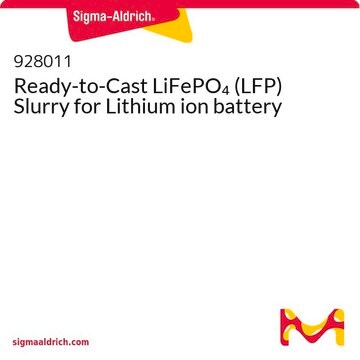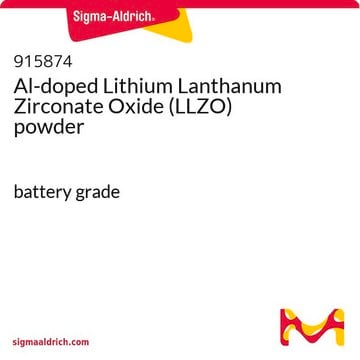759546
Lithium iron(II) phosphate
powder, <5 μm particle size (BET), >97% (XRF)
Sinónimos:
Ferrous lithium phosphate, Iron lithium phosphate, LFP, Triphylite
About This Item
Productos recomendados
grade
battery grade
assay
>97% (XRF)
form
powder
mol wt
Mw 157.76 g/mol
composition
LiFePO4
greener alternative product characteristics
Design for Energy Efficiency
Learn more about the Principles of Green Chemistry.
sustainability
Greener Alternative Product
particle size
<5 μm (BET)
mp
>300 °C (lit.)
density
3.6 g/cm3 (lit.)
application(s)
battery manufacturing
greener alternative category
InChI
1S/Fe.Li.H3O4P/c;;1-5(2,3)4/h;;(H3,1,2,3,4)/q+2;+1;/p-3
InChI key
GELKBWJHTRAYNV-UHFFFAOYSA-K
¿Está buscando productos similares? Visita Guía de comparación de productos
General description
Application
Features and Benefits
✔ Achieves 1000s of cycles
✔ Safer than cobalt or manganese-based cathode materials
✔ Reliable performance
Legal Information
related product
Storage Class
11 - Combustible Solids
wgk_germany
WGK 1
flash_point_f
Not applicable
flash_point_c
Not applicable
Certificados de análisis (COA)
Busque Certificados de análisis (COA) introduciendo el número de lote del producto. Los números de lote se encuentran en la etiqueta del producto después de las palabras «Lot» o «Batch»
¿Ya tiene este producto?
Encuentre la documentación para los productos que ha comprado recientemente en la Biblioteca de documentos.
Los clientes también vieron
Artículos
Professor Qiao's review explores stable microstructures for lithium metal fluoride batteries, advancing energy storage technologies.
Lithium-ion batteries offer high energy density and cyclic performance for portable electronic devices.
The critical technical challenges associated with the commercialization of electric vehicle batteries include cost, performance, abuse tolerance, and lifespan.
Lithium-ion batteries' characteristics make them popular for electricity storage due to portability, rechargeability, and low cost.
Nuestro equipo de científicos tiene experiencia en todas las áreas de investigación: Ciencias de la vida, Ciencia de los materiales, Síntesis química, Cromatografía, Analítica y muchas otras.
Póngase en contacto con el Servicio técnico











